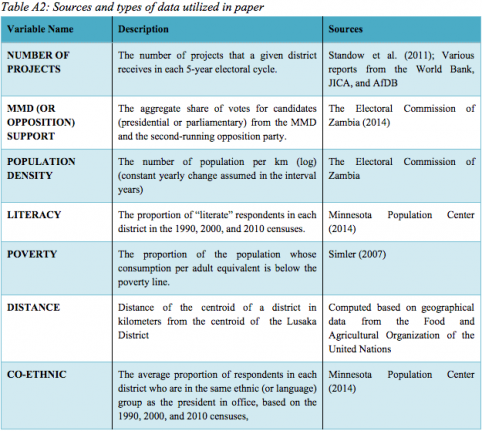As the ongoing debate continues over whether financial assistance is an effective way to improve development outcomes, the politicization of aid is one factor that some scholars suggest makes it harder for aid to reach the places where there is the most need or opportunity. In a recently released AidData Working Paper, The Political Economy of Aid Allocation in Africa: Evidence from Zambia, I set out to determine whether and how politics might influence subnational aid distribution by testing whether leaders who face elections tend to plan projects in areas that will win votes -- especially areas where they do not have strongholds? In other words, are incumbents using these public goods to try to expand their influence by impressing voters who weakly oppose them instead of rewarding constituents who are likely to already be voting for them?
Background: Using Geospatial Data to Analyze the Politics of Aid Allocation in Zambia
Zambia has experienced genuinely competitive elections over the past decade or so, which makes the country an interesting case to study how politics may shape the way aid is distributed.
Using AidData’s geocoded data to examine the different factors that might affect aid allocation throughout Zambia, I was able to analyze the politically-motivated distribution of development projects geographically, measuring the number of projects, votes per district and victory margins. Aid critics often simply examine incoming aid flows in the aggregate and outcomes at the national level without digging deeper. However, with georeferenced data on investments and outcomes, there is an opportunity to achieve a more nuanced understanding of the reasons why aid fails or succeeds at the subnational level.
One obstacle in conducting this research was that many donor agencies did not provide sufficient information on their projects to be included in the analysis. In fact, many donor agencies do not make their documents or reports publicly available, which makes it difficult for researchers to geocode their projects.
Given the lack of granular, project-level data available from many development partners, I focused on the projects funded by three agencies in Zambia for the period between 1991-2010, including: the World Bank, African Development Bank (AfDB), and Japan International Cooperation Agency (JICA).

Key Findings: Aid is Allocated to Advance Political Interests
I find that swing districts and districts where opposition to the ruling party is strong receive more development projects. These findings run counter to the conventional wisdom in the literature on African distributive politics that incumbents reward their own core supporters with more resources and material benefits. My findings, however, may be consistent with the aid-recipient government’s strategic efforts to buy off opposition supporters through targeting aid to districts where the ruling party is relatively unpopular. By focusing development efforts on districts where there is a relatively high concentration of weakly opposed voters, who may switch their political allegiance conditional on material benefits, the government seeks to maximize the vote-buying effects of development projects.
My research points to the fact that political incentives seem to better explain aid allocation than demographic or economic factors such as literacy or poverty. In other words, political leaders appear to be allocating aid funding and projects based on political interest, not need. These leaders are able to do so because of the discretion that development organizations grant them. Bilateral and multilateral development partners often defer to partner governments in determining where donor-financed development project activities should be sited within countries.
How should we interpret these results? This allocation of aid based upon political criteria in Zambia is not necessarily damaging from a development perspective, since the funded projects are being implemented and producing some results that may improve people’s lives. However, there is a real question as to whether this is the most efficient use of the resources available if they are not being allocated to the communities most in need of assistance.
More Granular Data is Needed to Understand Whether and Why Projects Are Successful
One implication of this study is that if development partners focus primarily on monitoring projects at the national level, they may fail to capture the positive or negative effects of their investments at the local level. Additionally, without strong project appraisal and due diligence policies and procedures that enable screening of investments ex ante based upon the proposed subnational distribution of funding, donors leave room for politicians to direct projects based upon self-interest.
One way to potentially solve this problem is encouraging open access to and use of subnationally georeferenced data on development investments and needs. Simply knowing that overall access to potable water has improved in a country is insufficient. We need to improve our understanding of where water projects are being sited vis-a-vis the locations of communities with the most and least access to clean water. Development partners, host governments and citizens all have important roles to play in opening up greater access to information on who is funding what, where and to what effect.

